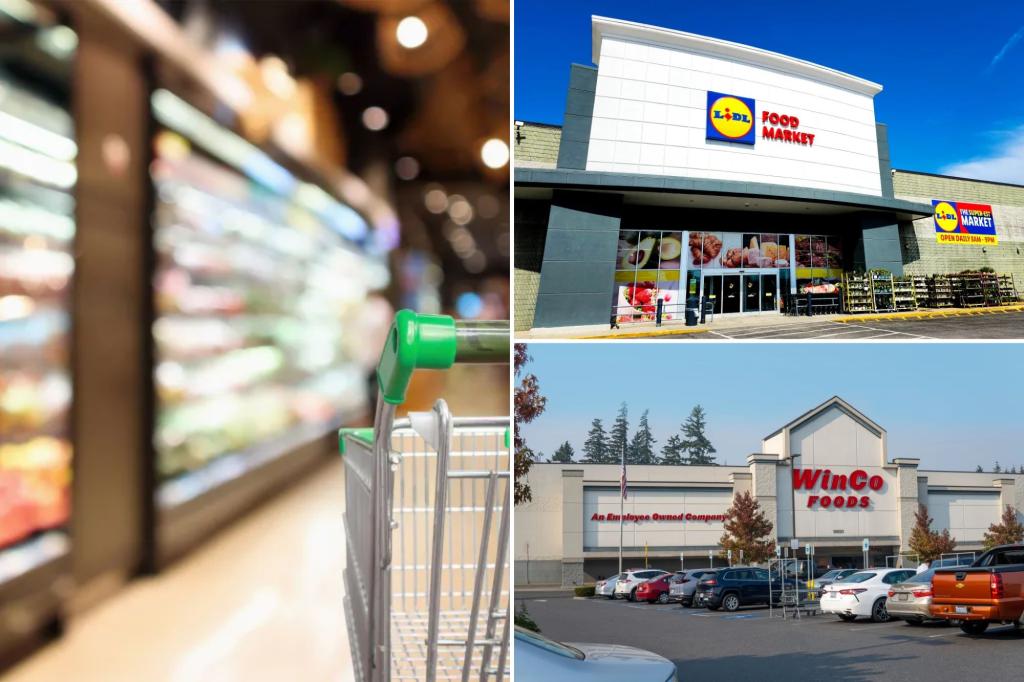Check out these checkouts.
As food prices are expected to rise by up to 3.5% in 2025, according to the USDA, many Americans are looking for ways to keep their grocery bills in check.
A recent study by MarketForce, which surveyed over 4,300 shoppers, highlights the grocery stores that best balance affordability with quality.
Whether it’s inflation, supply chain issues or simply the high cost of living, everyone could use a break at checkout.
Here’s your chance, according to the roundup, with seven grocers helping customers stretch their dollars without sacrificing taste or freshness.
1. Lidl: Discount giant with a European twist
Lidl has been a rising star in the U.S. discount grocery scene, especially in NYC, where it has been expanding locations, including in Brooklyn.
The store layout is inspired by European roots, which helps Lidl keep its overhead low by minimizing staffing and using a streamlined warehouse-style setup. This helps reduce costs for shoppers, making it one of the most budget-friendly options for families.
According to the MarketForce study, an impressive 81.4% of customers return to Lidl because of its unbeatable value.
The store’s affordable pricing is made better with the quality of its products, the report notes. In addition to the usual grocery items, Lidl also surprises customers with seasonal and non-food items, from power tools to potted plants.
2. WinCo Foods: Wholesale prices — without a membership
If you’ve ever dreamed of paying Costco prices without the membership fee, WinCo Foods is where it’s at.
This employee-owned chain has become a household name in many parts of the U.S., with 139 locations spread across 10 states.
WinCo operates a warehouse-style model focusing on low prices by cutting out the middleman. It buys directly from manufacturers and even has customers bag their own groceries.
The strategy must be working: a whopping 73.1% of shoppers cited value for money as their main reason for frequenting WinCo.
Its bulk sections are also noted as a treasure trove for those seeking to stock up on essentials like flour, rice and dried goods at steep discounts.
3. Grocery Outlet: Where discounts meet discovery
Grocery Outlet’s business model revolves around selling overstocked or discontinued items at discounted prices.
Locations vary by region, but the appeal is universal: customers can score big on both name-brand and private-label products.
Fresh produce, dairy and meat are always stocked, while their natural and organic sections offer a variety of specialty items like vegan and gluten-free foods — often for less than what you’d find at other places.
Notably, 71.4% of shoppers reported returning to Grocery Outlet for the exceptional value it provides.
4. Aldi: The discount king
Aldi’s reputation for value is legendary — and the numbers don’t lie.
The MarketForce study found that 70.4% of shoppers favor Aldi for the exceptional value it offers. With a European-inspired model, Aldi keeps costs low by minimizing staff, using simple displays, and encouraging customers to bag their own groceries.
Despite this no-frills approach, Aldi shoppers can find everything from pasta and canned goods to frozen items and fresh produce.
If you’re looking to make your budget stretch even further, Aldi is also home to great deals on dairy, baked goods and even alcohol.
5. Wegmans: Upstate store spreads far and wide
Known for its vast selection of high-quality store-brand products, Wegmans is a favorite among many shoppers, particularly in the Mid-Atlantic region.
The family-owned grocer boasts more than 110 stores and has become well-known for its excellent customer service and affordable prices. A solid 68.7% of MarketForce respondents cited value for money as their main reason for choosing Wegmans.
Wegmans stands out for its wide range of organic and healthy food options, from fresh produce to gluten-free snacks.
The grocer expanded to Long Island earlier this year and continues to extend its reach beyond the Northeast.
6. Trader Joe’s: Trading up
Despite its smaller footprint compared to traditional grocery stores, about 67.2% of study participants mentioned that they return because of the store’s value.
While it’s famous for its affordable and fun frozen-food options, much-beloved Trader Joe’s also serves up fresh produce, unique snacks, seasonal items and high-quality private-label goods.
7. Costco: Bulking up
While Costco may require a membership, the savings it offers can make it worth the investment.
Known for its bulk-buying model, Costco allows customers to purchase everything from household essentials to luxury items at steeply discounted prices.
Whether it’s buying a year’s supply of toilet paper, a bulk pack of fresh fruit, gourmet cheeses or pantry staples, according to the MarketForce study, 61.4% of customers return to Costco for its impressive deals.
Read the full article here

